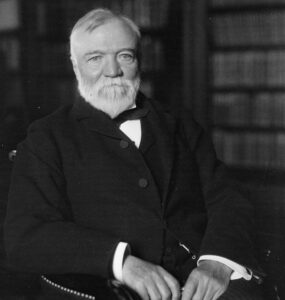“The principal object of management should be to secure the maximum prosperity for the employer, coupled with the maximum prosperity for each employee” – Frederick Winslow Taylor.
This is easily said, unfortunately not as easily established. The reason is simple, Most of the time people are unwilling to sacrifice something today for a better tomorrow.
This concept of maximum prosperity for the company involves the maximum prosperity for the worker has been understood for a long time by some of the smartest minds in business, for instance, in 1886 Andrew Carnegie wrote an essay about how to get rid of the labor strife that was very prevalent in America and much of the developing industrial world. in an essay entitled An Employer’s View of the Labor Question He put forth several suggestions in the essay. His first was this:
The first place must be assigned to the idea of cooperation, or the plan by which the workers are to become part-owners in enterprises and share their fortunes. There is no doubt that if this could be affected it would have the same beneficial effect upon the workman which the ownership of land has upon the man who has hitherto tilled the land for another. The sense of ownership would make of him more of a man as regards himself, and hence more of a citizen as regards to the commonwealth.
Andrew Carnegie
One benefit of this arrangement he admits will give the business the advantage of this arrangement will allow the owner to hire the best workers and pay the highest wages and I will add the fact they will also be able to produce the highest quality product in the shortest amount of time.
One drawback of this Carnegie admits is that workers do not want to have to deal with a downturn for the business and a change in lower wages. Carnegie also admits that many of the workers are not intelligent enough to manage capital wisely. It is true all people are not equal in all of their talents and wisdom. However, people working unselfishly together can overcome the difficulties of the business cycles. The owner can save resources to make sure there is money to pay workers when the business goes down. The workers doing the work can discover more efficient ways to produce the company’s product, creating more surpluses to sell for a profit.
The interesting thing about this approach is that it borrows ideas from Adam Smith and Karl Marx. Adam Smith stated surpluses needed to be sold to produce profits. In a company that is involved in a boom the owner must set aside some of the surplus resources to store up against the coming recession and realizing profits. Sharing the profits with everyone is a communistic sounding idea. However, in the long-term, it will bring the maximum prosperity for both employer and employee.
Karl Marx, one critique of capitalism, pointed out that capitalism is unstable and will always cause crises, booms, and busts, inflation, and depressions, we now say bubbles and recessions. Marx also stated that everyone acts like this situation is unique and will be the last one because we have now figured things out. It’s interesting to see how prophetic Marx was. We are now afraid of both inflation and recession with the economists and politicians are both continue to say we can avoid the next one.
Part of the solution is the owners and employees give up short-term selfish tendencies to gain long-term prosperity for both the business and employees.

